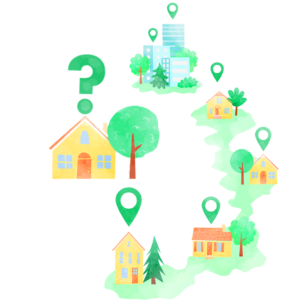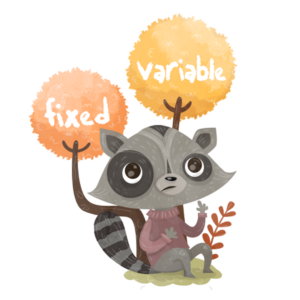
If you follow our blog, or are just generally savvy when it comes to personal finance, you know that buying a home is one of the best investments you can make. Unless you’ve got access to a Scrooge McDuck money pool, however, you’re going to need a home loan if you hope to own property one day.
Unfortunately, the question of how to get a mortgage is not as simple as anyone would hope. Mortgage lenders require quite a lot of hoop-jumping before they’ll agree to give you hundreds of thousands of dollars in the form of a home loan.
If you want to buy a house but aren’t sure where to start, don’t worry — we broke down the process of how to get a mortgage, from gathering documents to closing, just for you.
QUICK NOTE: this blog covers the mortgage process in the United States. If you live in Canada, you can find info on getting a mortgage (even if you have bad credit) here.

Before you begin house hunting or even considering which mortgage lender you might want to use, start by gathering all the legal and financial documents you’ll need in order to get approved.
Believe it or not, mortgage lenders are going to require you to prove you are who you say you are before they agree to give you any money. Luckily, basically any government-issued form of identification will work: drivers licenses, passports, and military IDs are all fine.
Mortgage lenders are much pickier, however, about proof of income than proof of identity. This makes sense, as the primary concern a mortgage lender when deciding whether or not to approve a mortgage application is whether you will be likely to make on-time monthly payments for 15 or 30 years.
Here’s a list of everything you’ll need to have on-hand in order to prove you have enough income to afford your monthly mortgage payment, every month and have your mortgage application approved:
If you have unconventional income sources, like Social Security payments, a pension, income from a rental property you own, or alimony/child support payments, you’ll need to include proof of this income as well.
Benefit letters generally suffice, if you can get them. 2 years’ worth of deposits should also work.
If you own your own business, there are some additional documents you’ll need in order to prove you can afford mortgage payments:
Before you start vetting lenders, make sure you’ve considered the following:
Do you have enough money on-hand to pay closing costs? If you don’t, it may be difficult to get approved for a mortgage. We’ll break down everything wrapped up into the vague term later on, but you should generally expect to need between 1% and 5% of the purchase price of the home on-hand, and that’s not including your down payment.
If your credit history is bleaker than HBO’s Chernobyl, then it may be in your best interest to hold off on applying for a mortgage. A lower credit score means higher interest rates, which in turn means you end up spending a lot more money on your mortgage than you have to.
Here’s how Experian buckets the possible ranges of credit scores:
Experian might publish your credit report, but they aren’t going to give you a mortgage, and they’re not going to determine your interest rate either. Usually banks don’t have an official “minimum credit score” required for a mortgage, but if you want to have access to the lowest possible rate on your home loan, you should shoot for a higher credit score (ideally above 750).
If your credit score is closer to 700 than 750, you’re going to lose out on opportunities to borrow at a low rate. Credit scores below 700 are really going to punish you financially on a home purchase, if you can even get approved.
We break down just how expensive increased interest rates can be over the course of a 30 year mortgage later on, but suffice it to say that a 1% rate increase could cost you between $50,000 and $150,000.
Debt to income ratio is another important factor in determining approval for a mortgage loan, as is the value of other assets you own (like retirement or savings accounts, other properties, etc.).
Before you apply for a mortgage, then, you’ll want to make sure you have documentation that shows all of this. Gather statements from your bank, your investment account, and any titles to valuable property you own.

If the question of how to get a mortgage wasn’t confusing enough, there are also several types of mortgages you might consider, depending on your long-term goals and present financial situation.
A conventional mortgage is the standard type of home loan available. Most conventional loans require a 20% down payment, although there are lenders who offer conventional loans with down payments as low as 5%.
Keep in mind, however, that if your down payment is not at least 20%, you will end up paying Private Mortgage Insurance (PMI), which is an extra couple hundred dollars per month.
Beyond the initial down payment, there are a couple of different options you can choose from when considering a conventional loan.
Lenders generally give mortgage applicants the option to choose between a fixed rate or adjustable rate loan. Fixed rate mortgages are attractive (and by far the most popular option) because they offer you stability: you know that the interest rate you have when you take out your loan is going to be exactly the same for the entirety of your loan. That also means your monthly payment will remain constant as well, so it’s easier to budget and plan.
Over the course of an adjustable-rate loan, your lender will adjust the interest rate to match current market conditions (usually annually). Most adjustable rate mortgages, however, have a period of stability at the beginning (usually between 1 and 10 years) where the rate won’t change.
Adjustable rate mortgages might be attractive to someone who knows they will be moving within the initial period of stability, because starting interest on adjustable rate loans tends to be lower than fixed rate ones (which also means a lower monthly payment). Once the fixed-rate period is over, however, your lender might raise your rate to match current market conditions, and your monthly payments may increase as a result.
At the end of the day, adjustable rate mortgages are seen as more of a high risk, high reward scenario, and most people get fixed rate loans.
Most borrowers tend to opt for a 30 year mortgage, as payments are much more affordable. With a 15 year mortgage, the payments are higher but you pay quite a lot less in interest over the course of the loan because interest has less time to compound on itself.
How much more expensive is a 15 year mortgage? Here’s an example:
Amanda is buying a home for $350,000 with a 20% downpayment. Her interest rate is 6%. For a 30 year mortgage, she would pay around $1,900 per month. Over the course of her mortgage, however, she’ll pay about $325,000 in interest.
Now, if she had a 15 year mortgage, she would be paying about $2,600 per month, but she would only be spending $145,000 in interest over the course of her loan.
So, while the 15 year mortgage is about $700 more per month, overall she’s saving nearly $180,000.
Here are a few reasons you might want to consider a 15 year mortgage:
There are several mortgage programs available that are backed by the government. These government backed loans are designed to make mortgages more accessible to specific populations.
FHA Loans are available to any borrower, though they are specifically designed to help first time homebuyers and lower income folks access homeownership. The benefits of an FHA loan come in the form of lower credit history requirements and the option for a down payment as low as 3.5%.
VA loans are, as you could probably guess, for veterans. If you qualify for a VA loan, you could get a mortgage with no down payment and an interest rate that will make everyone else jealous. What’s more, VA loans don’t require you to pay Private Mortgage Insurance, even when you don’t have 20% equity in your home.
USDA loan programs are designed to increase home ownership amongst low-income rural populations. As such, in order to qualify for a USDA mortgage, you have to live in a pre-designated “rural” area and meet income requirements, usually based on the median income in your area.
If you do qualify, however, a USDA loan can be a great option. There are no down payment requirements, and they are similarly lenient in terms of credit score.

Once you have all your documents in order and you know what kind of mortgage you’re looking for, you can start comparing lenders.
There are several factors you want to make sure you consider at this stage to ensure you find a lender that will charge you as little as possible for servicing your loan.
Given how much money mortgages deal with and for how long you end up paying them, the interest rate plays a big role in determining just how expensive your mortgage is. In fact, a difference of just 1% could cost (or save) hundreds of thousands of dollars.
Let’s look at an example (courtesy of an easily-Googlable online mortgage calculator).
Let’s say Sven wants to buy a house for $350,000. He has a 20% down payment and will be getting a 30 year conventional loan.
If Sven has a very good or excellent credit score, he could feasibly get a mortgage at 5.5%. Over the course of his 30 year mortgage, Sven is going to pay over $290,000 in interest, and his monthly debt payments will be about $1,800.
Now, if Sven had to borrow at 6%, his costs increase substantially: he’s now paying $1,900 per month and $324,000 in interest over the course of his loan.
At 6.5%, a mere 1% increase overall, his monthly debt payments increase to $2,000 and his total interest payments over the 30 year loan amount to $357,000.
APR represents the total cost of your mortgage (including interest, origination fees, and any other expenses you incur as a borrower) and is represented as a percent of the total loan amount.
As such, APR is going to be higher than your interest rate, however how much higher is the question you want to ask. APR will give you an idea of the bank’s individual fees, and so it could be a determining factor in terms of which lender you want to go with.
Before deciding which bank to go with for your mortgage, you’ll want to check on what that bank is going to charge you for closing costs. You’ll already have an idea of this if you looked into APR, however checking what the specific charges are will be important.
Closing costs include things like your down payment and the origination fees the bank charges for loaning you the money. Lots of these will be dependent on how much you borrow overall, but 1% is quite a lot less than 5% when you’re talking in the hundreds of thousands of dollars.
So, if one bank offers you a slightly better rate on the loan but has a much higher closing cost, it might not be worth it overall.
It may seem like an impossible dream to be able to pay off a mortgage early, however you should still ask if the bank enforces prepayment penalties.
Most banks don’t charge these penalties these days, but nothing feels worse than wanting to pay off your mortgage early and then discovering it’s going to cost you a few extra thousand dollars.
Make sure you check with the banks you’re considering, and if one of them charges a prepayment penalty, it might be a red flag.

Once you’ve decided which bank to go with, you’ll have to apply for a mortgage. If you gathered all the documents we discussed at the beginning of this article, the process should be relatively painless, and you could be prequalified in a matter of days.
Prequalification means the bank has taken a cursory look at your financial health and credit reports and agreed that, unless something wild happens or you lied in your application, they’ll give you a mortgage.
You’ll receive a prequalification letter, which is sort of like a tentative promise that the bank will lend you up to a certain amount of money in order to buy a home. You’ll need to have your prequalification letter in hand in order to make an offer on a house (most sellers won’t want to agree to sell to someone unless they know you’ll be able to secure the financing necessary to buy it at closing).
Once you’ve been prequalified, you can start looking at houses. You could get a realtor, or work on your own through Zillow or Redfin or whichever real estate site you happen to like best.
Generally, working with a realtor is a good idea, especially if it’s your first time buying a home or you’re relying on articles like this for information on home buying. As a buyer, you won’t have to actually pay your real estate agent anything (the seller actually takes care of that), and they’ll make sure you get all your ducks in a row prior to closing.

Once you’ve decided which house you’d like to live in, you can ask your real estate agent to make an offer to the sellers. You don’t really need to do anything else here, just sign some paperwork your agent will send your way.
At this point, however, you want to make sure you have all of your document ducks in a row (W-2s, bank statements, etc.), and that you have enough money handy to make your down payment. Most offers include an amount of “earnest money,” which is basically a portion of your down payment you offer to the seller in advance as sort of a token of your serious intent to make the purchase.
Earnest money counts as part of your down payment, so it’s not anything additional you need to do in order to get a mortgage, but it will help your offer be accepted.
Once you get an offer accepted, you move to close. Exactly which additional hoops you need to jump through before closing will depend on where you live, but if you have your documents and money handy, you won’t actually need to do too much (your real estate agent will guide you through everything).
Here’s a quick list of some of the common boxes that need to be checked prior to closing:
Home inspection: buying a house without getting it inspected first is like buying a car without test driving it — stupid. You want to make sure you know if anything serious is going to need to be repaired within the near future before you agree to spend hundreds of dollars on a piece of property. Some of the main issues you want to be looking for in an inspection report are issues with the foundation, the HVAC, or the roof.
Repair negotiations: if the inspection report has some issues that you’re not comfortable with, you have the opportunity to negotiate with the sellers to have them repaired or potentially reduce the purchase price of the home. For example, when we bought our first home, the radon test came back WAAAAAY above safe levels, so we asked the sellers to fix it before we bought the home. Usually, if the market isn’t absolutely bonkers and the requests are reasonable, the seller will agree to take care of them or reduce the sale price to account for you making the repairs yourself.
Appraisal: most (if not all) banks require mortgage applicants to get an appraisal of the home they plan to purchase because they don’t want to lend you huge amounts of money without being sure that the property that secures the loan is actually worth what you paid for it. If the appraisal comes back and the house isn’t worth as much as you offered for it, you’ll have to find the money to cover the gap or the purchase will fall through.
Title search: before you can buy a home, the bank needs to make sure that the person selling the house actually owns it and there are no liens against the property (i.e. they’re actually allowed to sell it). There’s no action for you to take at this point, but this is one of the expenses covered in your closing costs, so it’s worth mentioning.
Final walkthrough: usually the morning of or perhaps the day before you close on a house, you’ll do a final walkthrough to ensure that everything looks the way it’s supposed to. Especially if you negotiated repairs to be done prior to closing.
The closing: on closing day, you go into an office (usually your lawyer or title company, depending on where you live) and sign a lot of pieces of paper, after which you get the keys to your new home and (usually) a bottle of wine. Yay!
Any lender is going to check your credit reports to ensure your credit score is high enough to give you a loan at a reasonable rate. Most banks don’t have an official minimum credit score in order to offer you a mortgage, but if your credit score is below 700, you will either have trouble getting approved, or the interest the bank will ask you to pay on the loan might be prohibitive. In order to get the best possible rate on your home loan, you should shoot for a credit score of above 750.
YOUR FREE FINANCIAL PLAN
Are you ready to invest in your future?
Build your free plan today.
Start now